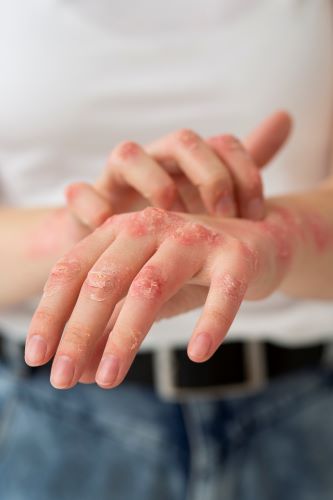Eczema causes, precautions and treatment.
Discover eczema, including its causes, symptoms, prevention strategies, and effective treatments. Learn how to manage this chronic skin condition and improve your quality of life with actionable advice and natural remedies.
Deciphering Eczema
Eczema, medically referred to as dermatitis, denotes a condition characterized by inflamed and hypersensitive skin. While various forms exist, they universally exhibit symptoms such as aridity and incessant itching.
Variants of Eczema:
- Atopic Dermatitis: Frequently associated with allergic reactions and respiratory conditions like asthma.
- Contact Dermatitis: Instigated by irritants or allergens upon direct skin contact.
- Seborrheic Dermatitis: Predominantly affects sebaceous areas, such as the scalp.
Suggestions: Benefits of personal training
Catalysts Behind Eczema
Eczema emerges from a confluence of hereditary predispositions and environmental provocations.
Genetic Predispositions: (1)
- A familial tendency toward eczema, asthma, or allergic disorders amplifies susceptibility.
Environmental Stimuli:
- Common irritants include dust mites, pollen, animal dander, and certain textiles.
Lifestyle Influences:
- Emotional duress and inadequate rest often intensify eczema episodes.
Identifying Eczema Symptoms
The symptomatic spectrum of eczema encompasses physical and psychological dimensions:
Dermatological Symptoms:
- Skin desiccation, erythema, swelling, and relentless scratching.
Emotional Ramifications:
- Heightened self-consciousness and psychological strain due to visible outbreaks.
Diagnostic Pathways
Eczema diagnosis hinges on a combination of clinical scrutiny and investigative tests:
- Visual Assessment: Dermatological examination to ascertain patterns and lesion characteristics.
- Patch Testing: To pinpoint allergens triggering inflammatory responses.
- Laboratory Analysis: Blood tests to identify concurrent allergic conditions.
Preventive Measures for Eczema
Mitigation involves curtailing exposure to aggravating factors:
- Steering Clear of Irritants: Avoidance of abrasive soaps and chemical-laden products.
- Optimizing Skin Hydration: Regular use of non-irritating, hypoallergenic moisturizers.
- Dietary Awareness: Monitoring consumables that may
- Blood Analysis: Conducted to detect associated allergies or underlying immunological conditions.
Prophylactic Measures to Mitigate Eczema
Preventing eczema requires a proactive approach to minimize exposure to potential triggers:
Avoidance of Irritants:
- Refrain from using harsh detergents, perfumed soaps, and abrasive cleaning agents.
Maintaining Skin Hydration:
- Regular application of emollients and hypoallergenic moisturizers to retain skin moisture.
Dietary Vigilance:
- Monitor for dietary allergens, eliminating foods that provoke adverse reactions.
- Moisturizing: Apply thick, lipid-rich creams or ointments immediately after bathing to lock in hydration.
- Protection: Use protective gloves during exposure to harsh chemicals and wear weather-appropriate clothing to shield the skin.
Treatment Modalities for Eczema
The approach to eczema management varies based on the severity of the condition, blending medical interventions and natural remedies:
Conventional Treatments:
- Over-the-Counter Options: Mild hydrocortisone creams and antihistamines to relieve inflammation and itching.
- Prescription Medications: Topical corticosteroids, calcineurin inhibitors, or systemic immunosuppressants for severe cases.
- Phototherapy: Controlled exposure to ultraviolet light to reduce symptoms.
Alternative and Natural Therapies:
- Herbal Solutions: Soothing applications such as aloe vera gel or calendula cream.
- Home Remedies: Oatmeal baths and coconut oil massages to alleviate dryness and inflammation.
- Dietary Supplements: Incorporating omega-3 fatty acids and probiotics to support skin health.
The Influence of Diet on Eczema
Diet plays a dual role, acting as both a trigger and a healer in eczema management:
- Foods to Avoid: Common culprits include dairy, soy, eggs, and nuts (if allergies are present).
- Nutrient-Rich Foods: Fish rich in omega-3s, leafy greens, and antioxidant-rich fruits can fortify skin resilience.
Stress: A Silent Agitator of Eczema
Emotional stress exacerbates eczema flare-ups by disrupting hormonal balance and elevating cortisol levels.
Management Techniques:
- Mindfulness Practices: Incorporate yoga, meditation, or deep-breathing exercises to manage stress effectively.
- Physical Activity: Engage in regular exercise to release endorphins, promoting emotional well-being.
Seeking Professional Guidance
Timely medical intervention is critical under the following circumstances:
- Signs of infection emerge, such as oozing, crusting, or excessive redness.
- Eczema significantly disrupts daily functioning or mental health.
- Symptoms persist or worsen despite standard treatments.
Navigating Life with Eczema
Living with eczema requires adaptation, self-awareness, and resilience:
- Community Support: Engage in support groups or forums to connect with others managing eczema, fostering a sense of solidarity.
- Tracking Triggers: Maintain a journal documenting environmental factors, dietary changes, and emotional states to identify patterns.
Frequently Asked Questions About Eczema
- Can eczema be permanently cured?
Eczema lacks a definitive cure but can be effectively managed with proper care. - Is eczema contagious?
No, eczema is a non-communicable condition. - What exacerbates eczema in children?
Allergens, environmental irritants, and sudden weather changes often trigger symptoms. - Does eczema affect more than just the skin?
Beyond physical discomfort, eczema significantly impacts emotional and psychological well-being. - Does eczema vary with seasons?
Yes, cold, dry winters and humid summers can intensify symptoms. - How long does a typical flare-up last?
Flare-ups may persist for days to weeks, depending on triggers and treatment adherence.
Conclusion
Eczema management hinges on understanding its multifaceted nature, recognizing triggers, and adhering to consistent skincare regimens. With tailored treatments, lifestyle modifications, and professional advice, individuals with eczema can lead fulfilling and comfortable lives.
